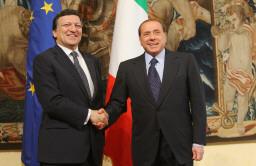Italian Premier Silvio Berlusconi and European Commission President Jose Manuel Durao Barroso agreed here Tuesday that the Irish No vote to the Lisbon Treaty will not block European reform.
A statement from the premier's office said that the two leaders saw ''eye to eye'' on the measures to take to boost EU integration.
Speaking at a joint press conference with Barroso, Berlusconi vowed that the Italian parliment would swiftly approve the Treaty, which is designed to make a larger Union more efficient and give it a higher international profile.
Berlusconi argued that controversial plans to take the finger prints of Italy's Roma population, including children, would ''only favour their integration''.
He said it would help put Roma on a par with EU citizens as well as getting their children into schools - a ''firm commitment'' by the Italian government.
Barroso told the press conference that there was ''huge cooperation'' between the EC and Italian authorities on the gypsy census, which has been criticised by international rights groups as well as the European Parliament.
He voiced the hope that there would be a ''positive solution'' to the case, in which Italy has been accused of discriminating against Roma.
Barroso said he was confident Rome and Brussels would agree on measures that combine security with human rights, in line with EU norms.
A UNICEF delegation will be in Italy from July 23 to 25 to meet the mayors of Milan, Bologna, Rome and Naples and examine the situation of gypsies in those cities, the Italian government announced Tuesday.
Earlier, Barroso said he did not expect any more countries to reject the EU's reform treaty after the Irish referendum vote.
Addressing the Italian parliament, Barroso said Poland and the Czech Republic would not block the ratification of the treaty.
''There has only been one No to the ratification of the treaty and I do not expect any more,'' Barroso said.
Irish voters rejected the Lisbon treaty in a referendum last month, casting doubts over its fate.
''During the next few months, it will be crucial to work in a close partnership with the Irish government to move ahead,'' Barroso said.









